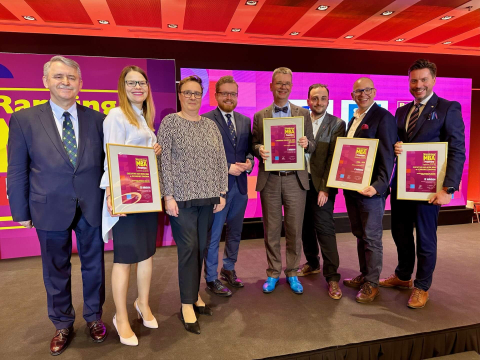The aim of the Medical Research Agency’s competition is to develop qualitative epidemiological research that will allow, among others, to examine the incidence of multi-morbidity, assess its impact on the health of the Polish population, and will also enable the use of the acquired knowledge to improve preventive, diagnostic and therapeutic procedures.
61 applications were submitted to the competition, and 58 were sent for substantive evaluation. Only 10 projects have received a recommendation for funding for a total amount of PLN 254,665,659.01, including two from the MUW.
Multi-morbidities among premature newborns
The leader of the first co-financed project – titled “Multi-morbidity among premature newborns (below 37 weeks of pregnancy), a nationwide and international cohort study” – is dr Joanna Seliga-Siwecka from the Department of Neonatology and Neonatal Intensive Care of the Medical University of Warsaw. The amount of funding from the Medical Research Agency is PLN 16,753,468.41.
The study will be carried out in 16 provinces of Poland. The research group will include 32,000 premature newborns. The collected data will enable the determination and analysis of the occurrence of risk factors among the population of newborns born before the 37th week of pregnancy and the assessment of th cause-and-effect relationship between the occurrence of specific risk factors and the development of multi-morbidity. Additionally, in order to collect data about patients included in the project and risk factors for multi-morbidities, the first Polish neonatology register will be created. This will allow an epidemiological study to be conducted in cooperation with the International Network for Evaluating Outcomes (iNeo) and comparison of multi-morbidity and treatment outcomes with data from Canada, UK, Sweden, Finland and Japan, among others.
MetAll: the significance of allergic inflammatory processes in multi-morbidities
The leader and principal investigator of the second co-financed project is dr hab. Filip Raciborski from the Department of Environmental Hazard Prevention, Allergology and Immunology of the Medical University of Warsaw. The project name is “MetAll: The significance of allergic inflammatory processes in the development of metabolic multi-morbidities [and their influence on] cardiovascular and respiratory diseases, diabetes and cancer through immunological and pathophysiological mechanisms. Relationship with developmental age infections, environmental factors and molecular processes of lifestyle diseases. Observations of a multi-generational cohort of atopic families compared to a cohort of healthy families.” The project will be carried out in a consortium with the Medical University of Białystok. The co-financing for the entire project is PLN 26,008,443.00, in which the MUW’s budget is PLN 21,064,907.58.
The study aims to “determine the significance of familial atopy as a factor responsible for inflammatory processes and pathophysiological phenomena leading to the premature occurrence of lifestyle diseases, as well as to demonstrate the impact of infection on the tested parameters of lifestyle diseases and to assess the epigenetic effects of atopic diseases in terms of the development of these diseases”. As was also written in the project application, “achieving a positive effect of the proposed research is of critical importance for building a national strategy to combat multi-morbidity and for Poland’s contribution to building international standards and transferring good practices to the international arena, in accordance with WHO and EU guidelines”.
